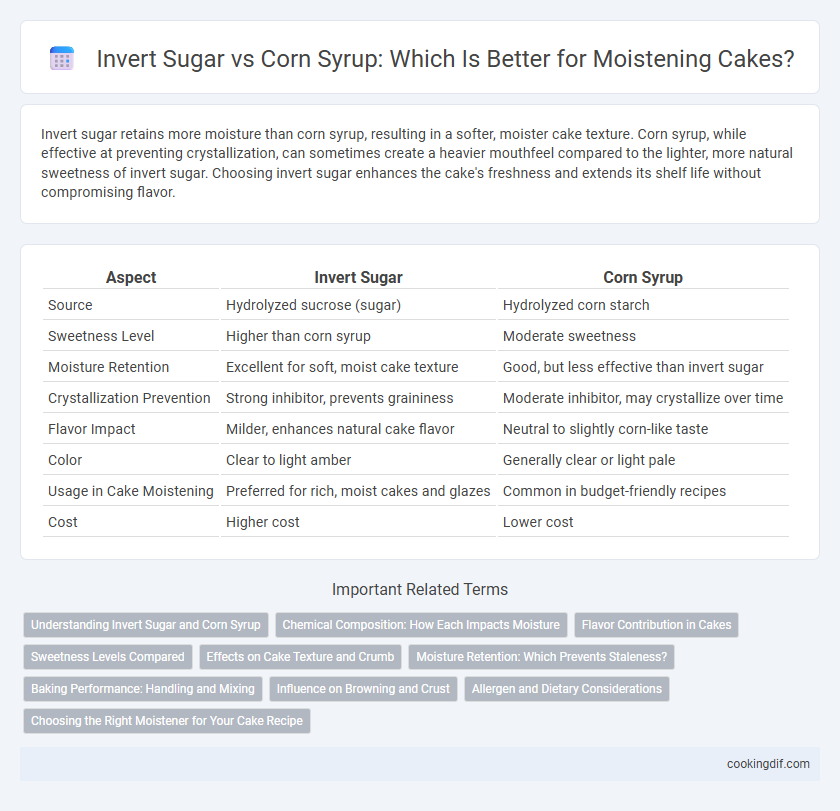Invert sugar retains more moisture than corn syrup, resulting in a softer, moister cake texture. Corn syrup, while effective at preventing crystallization, can sometimes create a heavier mouthfeel compared to the lighter, more natural sweetness of invert sugar. Choosing invert sugar enhances the cake's freshness and extends its shelf life without compromising flavor.
Table of Comparison
| Aspect | Invert Sugar | Corn Syrup |
|---|---|---|
| Source | Hydrolyzed sucrose (sugar) | Hydrolyzed corn starch |
| Sweetness Level | Higher than corn syrup | Moderate sweetness |
| Moisture Retention | Excellent for soft, moist cake texture | Good, but less effective than invert sugar |
| Crystallization Prevention | Strong inhibitor, prevents graininess | Moderate inhibitor, may crystallize over time |
| Flavor Impact | Milder, enhances natural cake flavor | Neutral to slightly corn-like taste |
| Color | Clear to light amber | Generally clear or light pale |
| Usage in Cake Moistening | Preferred for rich, moist cakes and glazes | Common in budget-friendly recipes |
| Cost | Higher cost | Lower cost |
Understanding Invert Sugar and Corn Syrup
Invert sugar, a mixture of glucose and fructose created by breaking down sucrose, retains moisture better than regular sugar, making it ideal for keeping cakes moist and extending shelf life. Corn syrup, primarily composed of glucose, also prevents crystallization and maintains moisture but lacks the same sweetness and moisture-retention properties as invert sugar. Understanding the distinct chemical compositions and hygroscopic qualities of invert sugar and corn syrup allows bakers to choose the best sweetener for texture and moisture control in cake recipes.
Chemical Composition: How Each Impacts Moisture
Invert sugar, composed of glucose and fructose, retains moisture effectively due to its hygroscopic nature, preventing cake staling by binding water molecules. Corn syrup, primarily glucose, also helps maintain moisture but with a less pronounced effect compared to invert sugar because of its lower fructose content. The higher fructose concentration in invert sugar enhances water retention, resulting in a moister, softer cake texture over time.
Flavor Contribution in Cakes
Invert sugar enhances cake flavor by providing a richer, more complex sweetness compared to corn syrup, which has a milder taste. It promotes better moisture retention and contributes to a softer crumb texture through its ability to attract and hold water molecules more effectively. Cakes moistened with invert sugar tend to exhibit improved flavor depth and prolonged freshness, making them preferable for artisanal baking.
Sweetness Levels Compared
Invert sugar has a higher sweetness level than corn syrup, making it a preferred choice for enhancing the moistness and flavor of cakes without excessive sugar. Corn syrup, while less sweet, contributes to moisture retention and texture by preventing crystallization and locking in liquid. Choosing invert sugar over corn syrup results in a richer, more intensely sweet cake with a tender crumb.
Effects on Cake Texture and Crumb
Invert sugar enhances cake moistness by attracting and retaining more water than corn syrup, resulting in a softer, finer crumb. Corn syrup, containing glucose polymers, contributes to a slightly denser texture but reduces crystallization, maintaining chewiness. The choice between invert sugar and corn syrup significantly influences cake tenderness, shelf life, and overall mouthfeel.
Moisture Retention: Which Prevents Staleness?
Invert sugar retains moisture better than corn syrup due to its higher hygroscopic properties, effectively preventing cake staleness over extended periods. Corn syrup, composed primarily of glucose, offers moderate moisture retention but tends to crystallize faster, leading to drier texture in baked goods. For optimal freshness and softness in cakes, invert sugar is preferred because it slows down moisture loss and extends shelf life.
Baking Performance: Handling and Mixing
Invert sugar offers superior baking performance compared to corn syrup by enhancing moisture retention and improving batter flow, resulting in evenly mixed dough with consistent texture. Its smaller sugar crystals dissolve quickly, reducing mixing time and preventing graininess often associated with corn syrup. Bakers prefer invert sugar for delicate cake recipes due to its ability to create smooth batter and maintain softness during baking.
Influence on Browning and Crust
Invert sugar promotes a deeper, more even browning in cakes due to its higher fructose content, which reacts efficiently in the Maillard process. Corn syrup tends to produce a lighter crust since it contains a mix of glucose and maltose that caramelizes less intensely. Using invert sugar results in a richer, more flavorful crust with enhanced moisture retention compared to corn syrup.
Allergen and Dietary Considerations
Invert sugar provides enhanced moisture retention in cakes while being free from common allergens such as gluten and nuts, making it suitable for diverse dietary needs. Corn syrup, derived primarily from corn starch, may pose concerns for individuals with corn allergies and often contains traces of genetically modified organisms (GMOs) unless certified non-GMO. Choosing invert sugar supports clean-label formulations and caters to allergen-sensitive consumers seeking consistent cake texture and shelf life.
Choosing the Right Moistener for Your Cake Recipe
Invert sugar retains moisture better than corn syrup due to its higher hygroscopic properties, resulting in a softer, longer-lasting cake texture. Corn syrup, often used to prevent crystallization, provides a stable structure but may yield a denser crumb compared to invert sugar. Selecting invert sugar enhances tenderness and prolongs freshness, while corn syrup suits recipes requiring glossy finishes and firmness.
Invert sugar vs Corn syrup for moistening Infographic

 cookingdif.com
cookingdif.com